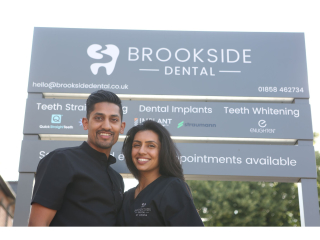
Article written by Dr Ravi Gathani and Dr Anisha Gathani - Brookside Dental, 94 St Mary's Road, Market Harborough:

Prevention is always better than treatment, avoiding toothaches and infections.
Preventive dentistry is what we love to teach as prevention is the best way to avoid a cavity. There are many measures you can take to help prevent the formation of a dental cavity or other types of tooth decay and damage. The first step in preventing a dental cavity is to start and keep up with a comprehensive oral hygiene routine.
While this can sound overwhelming, once it becomes a habit, you’ll be pleased to enjoy the healthy mouth and beautiful smile that comes with good oral hygiene. While there are many options for oral hygiene these days, here is a basic checklist of the core items you’ll need to incorporate into your daily routine to help prevent a dental cavity.
• Toothbrush: Everyone knows you need a toothbrush to keep your teeth clean, but many don’t give the variety of toothbrushes much thought. While there are hundreds of options available, look carefully to find a toothbrush that can reach all the surfaces of your teeth. It’s also a good idea to find a brush that includes a textured tongue cleaner, since bacteria that cause oral malodor often live on your tongue. We recommend an electric oralB toothbrush with the cross action head.
• Toothpaste: This is a critical component of your oral hygiene routine for the prevention of a dental cavity. While dozens of products are available, all dentists recommend selecting a product with fluoride, we recommend Colgate total advanced. The last thing at night, after brushing, spit the excess toothpaste and do not rinse with water to leave the paste covering the teeth.
• Dental Floss: Flossing on a regular basis is very important. By removing food particles from between your teeth, flossing can help prevent dental cavities. Many people find that flossing, particularly in tight spaces, is facilitated with a floss like OralB satin floss.
• Mouthwash: Mouthwash is often the final step in an effective daily oral hygiene routine. Not only does the use of a therapeutic mouth rinse leaves your mouth feeling clean and your breath fresh, it kills the bacteria that can cause plaque and gingivitis. We recommend using mouthwash once a day after lunch in the middle of the day with a 0.05% Fluoride mouthwash.
There are a number of important steps involved in keeping your teeth and mouth healthy from cavities and tooth decay. Taking good care of your teeth can help prevent tooth decay and ultimately cavities. Adhering to a comprehensive oral hygiene regimen is the first step to good oral health. Here are some important tips to help prevent tooth decay and cavities.
• Brush more often: Just because your dentist says to brush twice a day doesn’t mean you have to stop there. One great way to prevent the formation of plaque that causes cavities is to brush after every meal or snack. This is the golden rule of oral hygiene. Brushing after you eat or drink with a fluoride-based toothpaste can help keep your teeth clean and free of the plaque that leads to tooth decay and cavities.
• Limit your intake of sugary foods and drinks: Candy, sodas and other sugary foods contain sugars that help plaque-forming bacteria survive in your mouth. In addition, sugary foods or candies that stay in your mouth for longer periods of time can also have a greater impact in the formation of plaque and tooth decay. If you do indulge, brush your teeth after eating to help prevent the progression of tooth decay.
• Watch What You Eat: Foods that get stuck in your teeth, such as crisps, sweets, or cookies can also aggravate tooth decay. Opt to snack on raw fruits and vegetables as much as possible because they can actually help remove plaque by naturally “scrubbing” your teeth. They’re also healthier for your body.
• Floss and Rinse daily: While good brushing is critical, it won’t necessarily do the job alone. Flossing daily and using a mouth rinse that protects against plaque build-up will help reduce your risk of developing problems. Flossing removes the food particles that get lodged in between your teeth and slowly causes plaque build-up that leads to cavities.
• Protect Your Teeth with Fluoride: Protection is key in preventing tooth cavities; fluoride is known to prevent tooth decay. Ensure your water contains a safe level of fluoride, and use products that contain fluoride including toothpaste and mouthwash.
• Visit Your Dentist: No matter how diligent you are about your daily oral hygiene routine, see a professional twice a year for routine cleanings and exams. Having your teeth professionally cleaned will remove plaque and tartar that you can’t remove with over-the-counter products and tools.
Dr Ravi Gathani and Dr Anisha Gathani
For more information or to see other ways we can help, visit our website: https://www.brooksidedental.co.uk
Simon Perry - working 'tirelessly'! with thebestof team to drive our 'Buy Local' campaigns and support our very best independent local businesses.
The following Cookies are used on this site. Users who allow all the Cookies will enjoy the best experience and all functionality on the site will be available to you.
You can choose to disable any of the Cookies by un-ticking the box below but if you do so your experience with the Site is likely to be diminished.
In order to interact with this site.
To show content from Google Maps.
To show content from YouTube.
To show content from Vimeo.
To share content across multiple platforms.
To view and book events.
To show user avatars and twitter feeds.
To show content from TourMkr.
To interact with Facebook.
To show content from WalkInto.